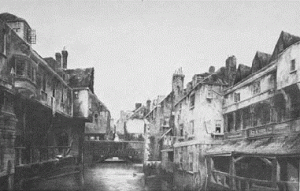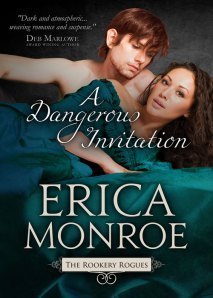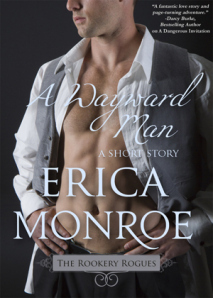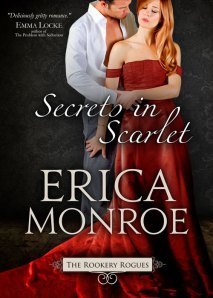Take a Walk on the Wild Side with Erica Monroe
Erica Monroe writes dark, suspenseful (and well-researched) historical romance. In her atmospheric debut novel A DANGEROUS INVITATION, she takes us out of the ballroom and drops us straight into the labyrinthine alleys and gritty flash houses of London’s East End. Rather than manners and courtship, the first book in the Rookery Rogues series is a story of survival and the transformational power of love. Read on to find out you can become eligible to win A DANGEROUS INVITATION ebook…
Torn from her life of privilege by her father’s death, Kate Morgan relies on her knowledge of finery to survive in one of London’s dark and depraved rookeries as a fence for stolen goods . The last man she ever expects, or wants, to see again is Daniel O’Reilly, the man who promised to love, honor and protect her, but who instead fled amidst accusations of murder.
One drunken night cost Daniel O’Reilly the woman he loved and the life he’d worked so hard to create. If he ever wants to reclaim that life—and Kate—he’ll not only have to prove he’s innocent of murder, but convince the pistol-wielding beauty to forgive his many sins.
With a killer on the loose, time is running out for them…
KH: Why did you choose to set Kate and Daniel’s story in 1832 during the short reign of King William IV rather than the more commonly used Regency time period between 1811-1820?
ERICA: I studied Victorian literature in college, and then I began to educate myself in the regency period when I started to write historical romances. The 1830’s represents the perfect merging of my two interests—it’s this strange period of social reform yet people are still trying to cling to what they used to have. The trade of corpses in the regency period is a big deal in the underworld, for a resurrection man could make far more selling bodies than he could in the honest work that might be available to an unskilled, uneducated laborer (read, not many jobs at all). The London Burkers (called that because their method of murder for dissection profit resembled that of legendary serial killers Burke and Hare in Edinburg, Scotland in 1828) were arrested in 1831. Two were executed, while another turned State’s Evidence and was released. I knew that I wanted to link my resurrection man villain to this case so I had to set it in January 1832 shortly after the executions. Mid-year 1832, the Anatomy Acts were repealed, and now surgeons had access to more bodies for dissection, so they didn’t have to use grave robbers to advance in their fields of study.
I found the idea of people being stolen from their graves to be sold as medical experiments to be utterly creepy and morbid, and admittedly, being a girl who grew up reading Edgar Allen Poe, I loved it. Resurrection men were considered to be one of the lowest types of thieves, reviled by everyone else in the London underworld. What better villains to use in the first book of my Rookery Rogues series, which centers on denizens of the London slum areas (called rookeries)?
KH: Your descriptions of daily life in the rookeries of London are vivid and create the dark, gritty atmosphere of A DANGEROUS INVITATION. You clearly spent a great deal of time researching the history, culture and geography of the East End—Bethnal Green, Jacob’s Island, and the St. Katharine Docks. What unexpected discoveries did you uncover that enriched or influenced the development of the characters and the suspense storyline?

Jacob’s Island, PD-US
R lee [CC-BY-SA-2.0 (http://creativecommons.org/licenses/by-sa/2.0)%5D, via Wikimedia Commons
ERICA: The new system of policing fascinated me—far more like the Scotland Yard we know and love than the original regency policing system. Prior to 1829, London did not have a centralized police force. You had a bunch of little districts and constables and a Night Watch that really bordered on useless. But 1829 and Robert Peel’s act brought forth a new structure, a more vigilant way of policing. This of course meant that some of the attitudes toward crime in the rookeries changed. The Bow Street Runners (think London’s first detectives) allowed flash houses (meeting places of thieves, often functioning as brothels as well) to exist because it was easy to get at informants when they were all congregated in the same police. The Met Police didn’t really believe in that—they focused on preventing crime instead of solving it. I use this distinction in my next novella, Secrets in Scarlet, which features the Met Police officer I introduced in A Dangerous Invitation.I also used the “Catholic Question,” which comes about throughout the 1800’s but really hit a breakthrough in 1829 when the Roman Catholic Relief Act was passed, which removed a lot of the restrictions that were still on Catholics in the UK. This and the Sacramental Test Act were huge in getting rights for Catholics. Prior to this act, Catholics could not hold office. The relations between the English and the Irish were already strained at best. I use this in A Dangerous Invitation as my hero Daniel O’Reilly is Irish, but he has been raised since childhood in Sussex. He feels like a man of two nations. Daniel has been the victim of racial prejudice, for in 1832 the Irish were considered not much better than dogs in the street by a lot of England’s population. This plays into his interactions with Kate and his feelings toward himself. He has to learn that he is indeed worthy of love.
KH: Peelers, dimber morts, crank…uh, translation please  Was it difficult to learn the street slang of the period?
Was it difficult to learn the street slang of the period?
ERICA: A Peeler refers to the Metropolitan Police Officers, called Peelers or Bobbies because of Robert Peel, who was the main person behind the bill establishing the new force. A dimber mort refers to a pretty wench, and crank is a cant term for gin (important because of Daniel’s struggle with remaining sober).
I actually really enjoy the slang. I’ve never had an aptitude for foreign languages, but thieving cant to me feels like a secret language based in English so I can understand it. It was important to me that my thieves sound like they grew up in the East End and not posh aristocrats. These are people deprived of formal education, growing up in neighborhoods where they pretty much had to steal to eat. They’re going to have their own set of words for things, jargon that’s been doctored so that the Police can’t fathom what they’re saying.
In writing A Wayward Man, my short story prequel to A Dangerous Invitation, it’s been interesting to write the dialogue for Kate because this is before she ends up in the rookeries. She doesn’t know those slang terms and she hasn’t changed to coarser language. I paid a lot of attention to dialects, trying to properly mimic what people would sound like in different parts. I’ve no idea if I got it all right, but it “feels” more authentic to me, at least.
KH: What is your favorite slang expression?
ERICA: There are so many good ones, and some really, really vulgar ones. There’s about 57 different terms for prostitutes, most of which end up being quite depressing.
Some of my favorite ones that I find can be used in historical romance are “collar day” for being executed at Newgate prison, “dive” meaning to pick a pocket, and Drury Lane ague meaning venereal disease (given that prostitutes often frequented Drury Lane).
KH: What’s next in The Rookery Rogues series?
ERICA: Two things. One, I’ve got the short story prequel to A Dangerous Invitation coming out in February, and it is titled A Wayward Man. This starts before Daniel leaves London, three years prior to the beginning of ADI. It’s about 10,000 words and I will be offering it up for free.
After that, I’ve got Secrets in Scarlet, which is a novella. I hope to have it out sometime around late March.
Here’s the blurb: When a girl is murdered at a factory in one of London’s rookeries, Thaddeus Knight comes in to investigate. But it’s not just the factory owners that Thaddeus wants information on–the devilishly intriguing Poppy O’Reilly is a puzzle he’d like nothing more than to solve. Protecting her young daughter is the most important thing to Poppy, and Thaddeus threatens the false identity she’s carefully constructed. The last thing she should do is allow Thaddeus close to her family, yet she can’t stay away from him. With danger around the corner, will the secrets of a scarlet woman lead to their undoing?
Can’t wait to read more? You can find Erica’s books on Amazon, B&N, Smashwords, iTunes, and AllRomanceBooks.
What are the elements you look for in historical romantic suspense? Do you have a favorite time period? House parties vs Ballrooms vs Gaming Hells? Do you like your stories filled with members of the ton? Can a housemaid become a duchess? Tell us what you like to read! Erica is giving away an e-copy of A DANGEROUS INVITATION to one lucky commenter!
Filed under: Author Interview, Krista Hall Tagged: debut, Erica Monroe, giveaway, historical romantic suspense




![R lee [CC-BY-SA-2.0 (http://creativecommons.org/licenses/by-sa/2.0)], via Wikimedia Commons](https://i.gr-assets.com/images/S/compressed.photo.goodreads.com/hostedimages/1391542409i/8408318.jpg)




